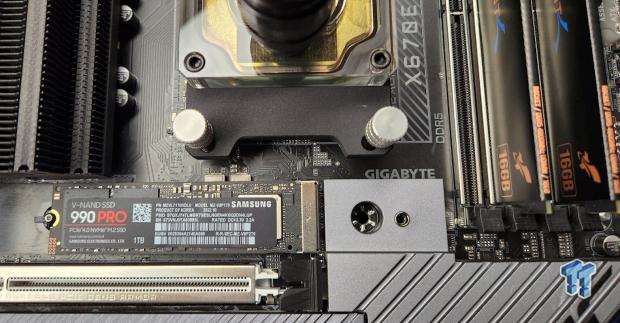Samsung 990 PRO 1TB SSD Review – More Unparalleled Performance
We’ve crowned Samsung’s 2TB 990 PRO the best-performing flash-based consumer SSD ever made. Now let’s see what the 1TB model can do.

Quick Navigation
Introduction & Drive Details
Sony PlayStation 5 – M.2 Storage Expansion
Synthetic Benchmarks: CDM, Anvil, ATTO
Real-World Testing: Transfers, 3DMark SSD Gaming Test, PCM10 Storage
Final Thoughts
Introduction & Drive Details
It’s coming up on two months since we crowned Samsung’s 990 PRO 2TB the world’s best performing flash-based consumer SSD. Since then, nothing has changed. Samsung’s 990 PRO 2TB is still the world’s best-performing consumer SSD.
However, for two months, we’ve had a burning question that keeps us awake at night. Exactly how fast is the 1TB model? Based on the 2TB model’s dominant performance and Samsung’s factory specs, we can speculate that the 1TB model would indeed be the second-best performing flash-based consumer SSD ever made.
However, speculation is one thing, and real numbers are another. So, for the past couple of months, we’ve been attempting to obtain a 990 PRO 1TB review sample without success. It seems as though Samsung is dragging its feet in sampling the 1TB model. Well, enough with losing sleep over it, we went ahead and purchased our own so that we could put some actual numbers to Samsung’s newest 1TB offering. We want to reward our readers with what is, as far as we know, the only mainstream review of the 1TB 990 PRO.
Now because we’ve already done a deep dive into the 2TB 990 PRO and what makes it tick, we aren’t going to dive in so deep with this one other than to reiterate what Samsung has to say about the new level of performance the 990 PRO brings to the fray:
With up to a 55% improvement in random performance over the 980 PRO, the 990 PRO Series is particularly well-suited for heavy gaming as well as creative and productivity tasks. The 990 PRO Series are high-performance PCIe 4.0 SSDs for gaming consoles or PCs with high speed and power efficiency, thanks to breakthrough innovations in proprietary NAND, controller, and software technology. Coupled with outstanding random read/write speeds and optimized for Microsoft’s DirectStorage API, it provides an immersive gaming experience for users”.
Alright, strap in as we demonstrate by the numbers what the world’s best-performing 1TB flash-based consumer SSD can do for you.

Pricing is higher than what we are typically seeing from Samsung’s competitors, and we are fine with that as we believe, in this case, you get what you pay for and then some.





As always, when you buy a Samsung SSD, you get free supporting software that makes maintenance and system migration simple and free. Click here to download it. Among other things, with Samsung Magician, you can set the 990 PRO to full power mode, enabling significantly better performance. We recommend enabling it, which we do whenever we have the option to do so.
Jon’s Test System Specifications
Intel Test System
Motherboard: ASUS ROG Z690 HERO
CPU: Intel Core i9-13900K – Buy from Amazon
Cooler: Alphacool Eissturm Hurricane Copper 45 – Buy from Amazon
RAM: Sabrent Rocket DDR5 32GB – Buy from Amazon
Graphics Card: MSI SUPRIM X RTX 3080 12GB – Buy from Amazon
Case: PrimoChill’s Praxis Wetbench – Buy from Amazon
Power Supply: be quiet! Dark Power Pro 12 1200W – Buy from Amazon
OS: Microsoft Windows 11 Pro 64-bit – Buy from Amazon
AMD Test System
Motherboard: GIGABYTE X670E AORUS Master
CPU: AMD Ryzen 5 7600X – Buy from Amazon
Cooler: Alphacool Eissturm Hurricane Copper 45 – Buy from Amazon
RAM: Sabrent Rocket DDR5 32GB – Buy from Amazon
Graphics Card: MSI SUPRIM X RTX 3080 12GB – Buy from Amazon
Case: PrimoChill’s Praxis Wetbench – Buy from Amazon
Power Supply: be quiet! Dark Power Pro 12 1200W – Buy from Amazon
OS: Microsoft Windows 11 Pro 64-bit – Buy from Amazon
Because we at TweakTown like to be first at everything whenever we can, we will present our storage performance results for the test subject on both 13th Gen Intel and 7000 Series AMD platforms going forward for the foreseeable future. Because Intel still delivers the best real-world storage performance, (Look Here), our running chart will continue to be Intel-based until AMD can deliver better real-world storage performance than its rival.
Sony PlayStation 5 – M.2 Storage Expansion
PS5 Read Performance
With Sony’s wildly popular PlayStation 5 console now enabled for M.2 NVMe SSDs to be used as fast storage expansion, we include results for PS5 compatible SSDs we test as a part of our reviews going forward.


For 5,500 MB/s plus capable SSDs that don’t have an adequately sized PS5 compatible heatsink or other SSDs where the heatsink provided doesn’t fit right and can be removed, we both use and recommend Sabrents unparalleled PS5 heatsink available here.


We only chart SSDs that can deliver a minimum of 5,500 MB/s read, which is Sony’s original recommendation

Samsung specs its 990 PRO series as capable of delivering 6,558 MB/s read throughput when employed as internal expansion storage for the PS5. We find this to be spot on with our 1TB 990 PRO delivering 6,557 MB/s in read performance.
Synthetic Benchmarks: CDM, Anvil, ATTO
CrystalDiskMark





AMD continues to deliver the highest sequential throughput, so it’s no surprise to see the lone AMD result at the top of our Intel-based chart. Samsung specs its 990 PRO as capable of up to 7,450 MB/s sequential read throughput, quite obviously when paired with an AMD-based platform, and we find that easily achievable with our AMD hardware. On the Intel side of things, our 1TB test subject is delivering identical read throughput to that of its larger sibling.
Very rarely do we even take a second glance at sequential write throughput because we don’t consider it to be an important performance metric, but this time the result here caught our attention. Never before in the history of consumer SSDs have we seen anything other than Phison-controlled SSDs hit the milestone of 7,000 MB/s sequential write throughput. The 1TB 990 PRO does it without a problem on our Intel Platform. Impressive.
Moving to the all-important Q1T1 random read chart, we see exactly what makes Samsung’s 990 PRO so special. Q1T1 random read performance. Nothing else is even close. Performance that matters.
Anvil’s Storage Utilities






Our 1TB test subject scores a bit higher on our AMD X670E platform than it does on our 13TH Gen Intel platform due to AMD’s inherently higher sequential throughput. Samsung specs the 990 PRO 1TB as capable of delivering 1.2 million random read IOPS (200,000 IOPS less than the 2TB model), and that is exactly what we are seeing in spite of our much more demanding user state.




More than anything else, ATTO gives us a clear picture of what transfer sizes a particular SSD favors in terms of sequential throughput. The 990 PRO favors sequential transfers of 512 KB or larger when serving data to the host and 128 KB or larger when programming data.
Real-World Testing: Transfers, 3DMark SSD Gaming Test, PCM10 Storage
Transfer Rates



Our 100GB data transfer test is not your ordinary 100GB of data. Ours is a crushing mix composed of more than 62K files. Write performance random or sequential, is an infrequent operation, and as such, we do not consider it to be an important performance metric in the consumer space. An example being how many times is a game installed vs. how many times it’s played. 1,564 MB/s is less than many of its lesser-performing contemporaries but more than enough for our liking.



Quite the opposite when it comes to an all-important performance metric like serving data to the host. It’s what consumer SSDs are doing 80% of the time on average. Here, our 1TB test subject delivers the goods in spectacular fashion. Performance that matters.
3DMark SSD Gaming Test
UL’s newest 3DMark SSD Gaming Test is the most comprehensive SSD gaming test ever devised. We consider it superior to testing against games themselves because, as a trace, it is much more consistent than variations that will occur between runs on the actual game itself. This test is in fact the same as running the actual game, just without the inconsistencies inherent to application testing.
In short, we believe that this is the world’s best way to test an SSDs gaming prowess and accurately compare it against competing SSDs. The 3DMark SSD Gaming Test measures and scores the following:
Loading Battlefield V from launch to the main menu.
Loading Call of Duty Black Ops 4 from launch to the main menu.
Loading Overwatch from launch to the main menu.
Recording a 1080p gameplay video at 60 FPS with OBS (Open Broadcaster Software) while playing Overwatch.
Installing The Outer Worlds from the Epic Games Launcher.
Saving game progress in The Outer Worlds.
Copying the Steam folder for Counter-Strike Global Offensive from an external SSD to the system drive.



Gaming is a performance metric that matters to the majority of DIY consumers, especially to the enthusiast crowd that TweakTown caters to. 5K here with data on the drive is ultra-elite and our test subject delivers ultra-elite results on both AMD and Intel platforms. Outstanding.
PCM10 Storage Tests
PCMark 10 Storage Test is the most advanced and most accurate real-world consumer storage test ever made. There are four different tests you can choose from; we run two of them.
The Full System Drive Benchmark and the Quick System Drive Benchmark. The Full System Drive Benchmark writes 204 GB of data over the duration of the test. The Quick System Drive Benchmark writes 23 GB of data over the duration of the test. These tests directly correlate with mainstream user experience.
PCMark 10 Full System Drive Benchmark



This particular test writes 204GB data and covers a broad range of common consumer tasks, including booting Windows 10, file transfers, Adobe and Office applications, and startup times for games, including Battlefield V, COD Black Ops 4, and Overwatch. Unlike synthetic numbers, this is comprehensive real-world data which is why we use it to rank SSDs in terms of user experience.
This is what a higher level of performance, real performance, looks like. Nothing is even close to Samsung’s 990 PRO.
PCMark 10 Quick System Drive Benchmark



Again, nothing else is even close. The most performance where it matters most. Impressive.
Final Thoughts
Well, now we’ve got some real numbers to answer our two-month-long burning question. Our 1TB test subject delivered as we speculated it would.
Samsung’s 990 PRO 1TB is indeed the second-best performing flash-based consumer SSD we’ve ever tested – second only to its 2TB sibling. Being faster at 2TB than 1TB is a bit different than we’ve seen from some other Gen4 flagship performers, including the 980 PRO, which is noticeably better performing at 1TB than it is at 2TB.

We rank SSDs in terms of overall user experience (performance where it matters most) as expressed by PCMark 10 storage and 3DMark gaming storage tests. We consider a user experience score of 12K or more to verify an SSD as a TweakTown Elite performer.
This chart sums up what the 990 PRO is all about better than any words can. By far, the biggest jump in scoring from one SSD to another is the 990 PRO compared with the next best-performing SSD. This is total domination.

